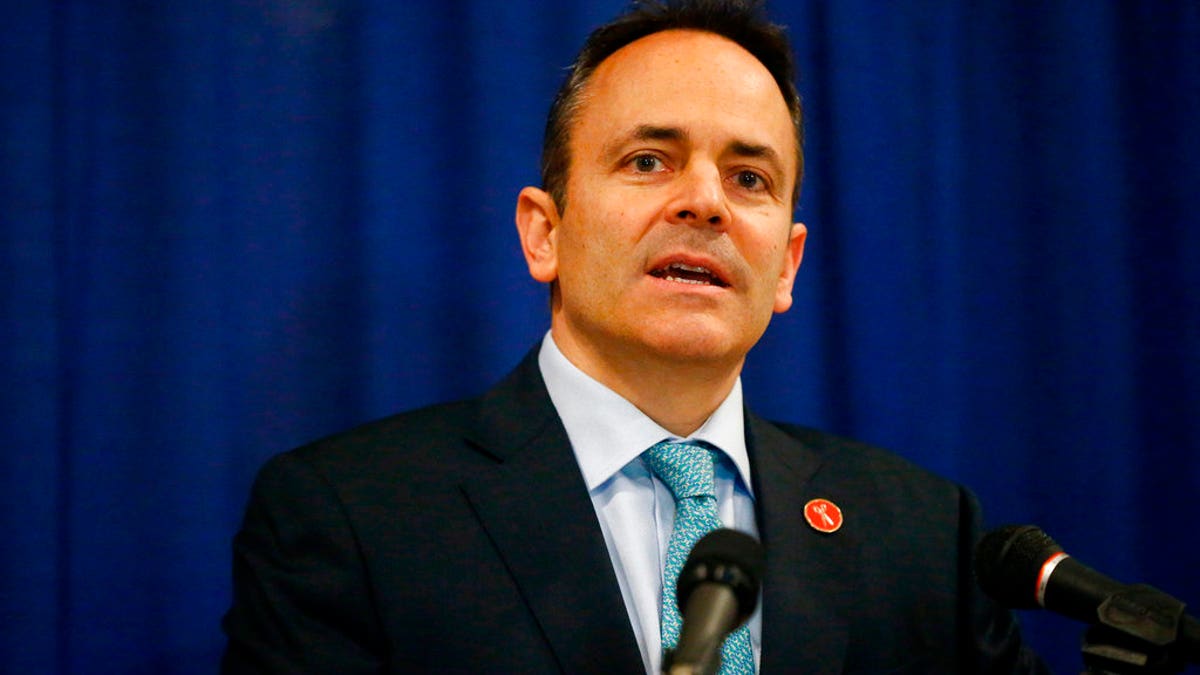
Kentucky Gov. Matt Bevin speaks at the Capitol Rotunda in Frankfort, Ky., Jan. 12, 2018. (Associated Press)
FRANKFORT, Ky. – A federal judge says Kentucky can't require poor people to get a job to keep their Medicaid benefits, chastising President Donald Trump's administration for rubber-stamping the new rules without considering how many people would lose their health coverage.
The decision is a setback for the Trump administration, which has been encouraging states to impose work requirements and other changes on Medicaid, the joint state and federal health insurance program for the poor and disabled. Kentucky was the first state in the country to get that permission, and the new rules were scheduled to take effect Sunday in a northern Kentucky suburb of Cincinnati.
But Friday, U.S. District Judge James E. Boasberg blocked the rules because it said the Trump administration never adequately considered whether the changes would comply with the central tenet of Medicaid: Providing health care for its citizens.
"The Secretary never provided a bottom-line estimate of how many people would lose Medicaid with (the new rules) in place. This oversight is glaring," wrote Boasberg, an appointee of former President Barack Obama. "For starters, the Secretary never once mentions the estimated 95,000 people who would lose coverage, which gives the Court little reason to think that he seriously grappled with the bottom-line impact on healthcare."
"The Secretary never provided a bottom-line estimate of how many people would lose Medicaid with (the new rules) in place. This oversight is glaring."
Boasberg ordered that Kentucky's approval of the project be vacated and sent it back to the U.S. Department of Health and Human Services so the process could be restarted.
U.S. Sen. Ron Wyden, the top Democrat on the committee that oversees Medicaid, said the decision is "good news for Americans who think health care is a right, not a prize to be won after enduring piles of bureaucratic busy work." But Seema Verna, who leads the Centers for Medicare and Medicaid Services, said the ruling was "disappointing" and indicated the administration could appeal the ruling.
"In the meantime, we will continue to support innovative, state-driven policies that are designed to advance the objectives of the Medicaid program by improving health outcomes for thousands of low-income Americans," she said.
Obama's health care law gave states the option of expanding Medicaid coverage to able-bodied adults. Kentucky, under former Democratic Gov. Steve Beshear, was one of 32 states that did so.
But Republican Gov. Matt Bevin, elected in 2015, said the program was too expensive to continue. He asked for permission to impose new rules, including charging monthly premiums and requiring at least 80 hours of "community engagement" per month, which could include working, volunteering or going to school.
Boasbert's decision blocks those rules, for now. Bevin did not comment on the ruling. But Adam Meier, Bevin's secretary of the Cabinet for Health and Family Services, says if the ruling stands "we will have no choice but to make significant benefit reductions." He said the state is facing a $300 million shortfall in Medicaid over the next two years, and the new rules would have helped the state save money. Without them, Meier said they would have to eliminate dental, vision and pharmacy benefits for low-income adults.
The Trump administration had argued Obama's Medicaid expansion essentially created a new program under Medicaid. Allowing states to cover low-income adults with no children living at home changed the nature of the program, the administration asserted, and opened the way for provisions such as work requirements.
The national implications of Friday's ruling could take a while to sort out. Officials in Arkansas have already implemented similar work requirement rules there.
The drive to expand Medicaid in GOP-led states had gotten a boost from the prospect of work requirements, which appeal to conservatives. In Virginia, work requirements are part of a compromise between Democratic Gov. Ralph Northam and Republican legislators to expand Medicaid.
Nationally, about 12 million people have been covered through expanded Medicaid, which offers health insurance to people making up to 138 percent of the federal poverty line or about $16,750 for a single person.
State officials had spent months preparing to roll out the new rules, including printing and mailing eligibility notices to people impacted by the rule changes and identifying the 4,200 people in Campbell County who would be subject to the new requirements. Meier said it would cost about $600,000 to do all of that again.
Lots of people were exempt from the new rules, including pregnant women, full-time students, primary caregivers of children and the elderly and anyone designated "medically frail" — a broad term that includes people suffering from alcohol or drug addiction in a state that has been among the hardest hit by the opioid crisis. But Boasenberg said these protections were not enough for the Trump administration to "rubber stamp it."
Alonso-Zaldivar reported from Washington.










































